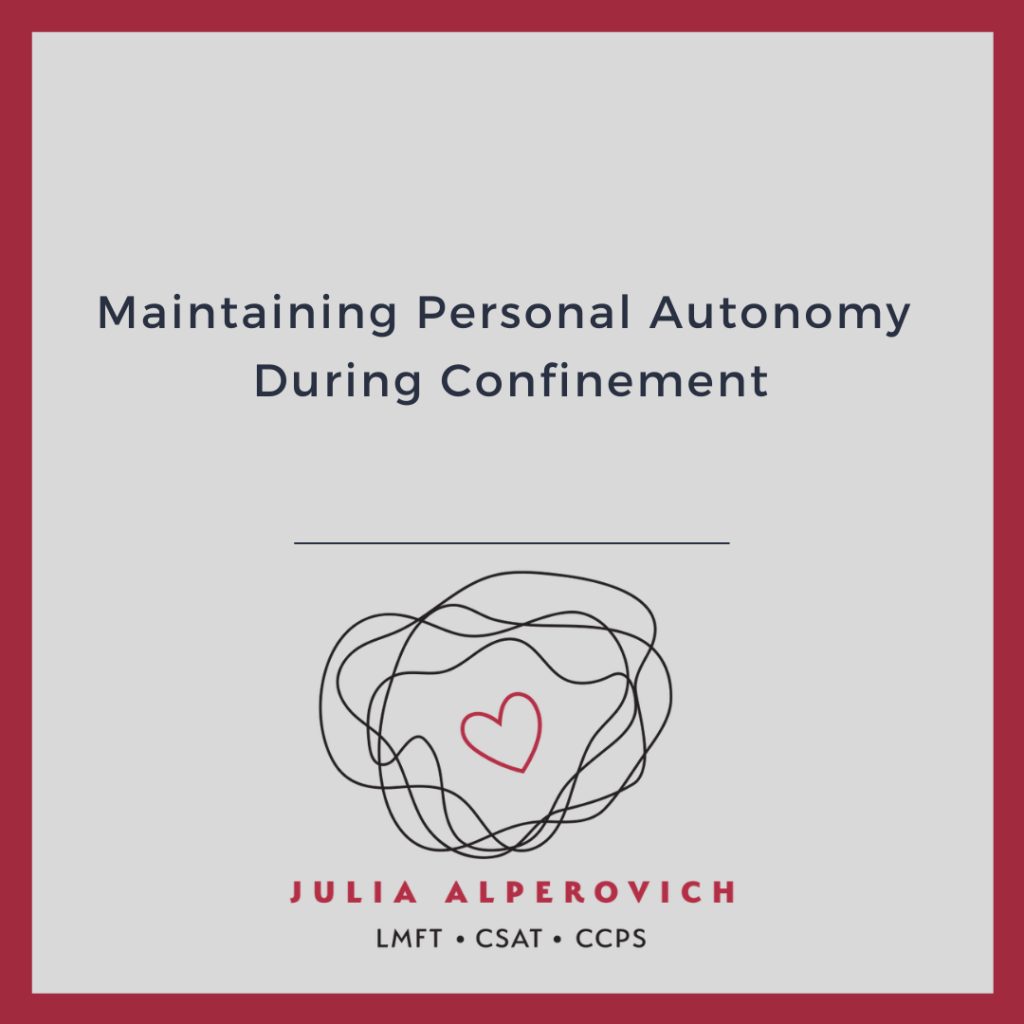Confinement resulting from COVID 19 pandemic is testing most relationships. Many foundations are tested by the challenges of parenting during crisis, partner behaviors, job loss, and underlying trauma. It may feel easier to self soothe and step into behaviors, addictions, or patterns rather than do work at this time, but maintaining your distance and keeping boundaries intact is more important than ever in a crisis. Below are ways to maintain distance, personal autonomy, and boundaries during confinement. Just because you are five feet away, does not mean that you have to lose autonomy or not pursue your own personal growth. Here are some tips for Maintaining Personal Autonomy during Confinement.
Self Care Routines
Lots of self care routines happen outside the home and for good reason, highlights at home are a terrible idea, but bubble baths are not. Make a schedule for your self care and your partner’s self care as an activity as important as school exercises for your kids. If you do want to share some wellness, download an app and make it part of your quality time.
Entertainment Schedule
Oh great, another schedule. This is more about what are the things that you share, such as TV, or cooking, that can be the source of resentment if one partner wishes or demands to supersede another. You don’t have to suffer through Ben Hur or Great British Castles while your partner watches Ru Paul Drag Race, if you are watching together, it needs to be together, otherwise put it on the schedule for self care.
Caregiver Breaks and Job Equality
In remote work from situations there is likely to be some triggering around how resources are obtained and responsibilities. With a few open conversations and scheduling, this can get much easier, but you need to maintain boundaries. Childcare is a challenge at the moment, and even if one parent makes more money with a more “demanding” outside world job, the primary caregiver is doing an important and stressful job that needs recognition and support. Give each other credit and breaks and do not kitchen sink fights and bring up everything at once, while at the same time, refrain from sarcasm and debasement of important work, in or out of the house.
Outdoor Activity
Get fresh air privately. You do not need to do everything together, but this is one activity I would recommend. I recently did some gardening. I don’t know if the plants will survive when I start my practice back up in person in May, but I personally love this time to center and explore things that were latently in my mind. Taking walks and talking is a great way to spend quality time with your partner and have big talks. Exercise promotes creative thinking and problem solving and you may find that you come to better accords on walks than in the long coffee conversations in your kitchen.
Hobbies
Painting is something I rarely get the opportunity to do. It is not something for my partner and I, it is just something I love. If you love it, it makes your feel good, do it. If you have a partner that perceives your choice to paint privately over spend time with them, have a conversation first about their needs and what is or is not being met by spending time painting. Get to the bottom of it beforehand.
These are mostly examples of self care and how to share activities. They require scheduling, sensitivity, and respect for your partner above all. Maintaining your boundaries during this time can be a minefield and I take Zoom sessions if you need help navigating, but remember that your needs are important, if not more important, than your partners. Be sure that they are met and that you are taking time for yourself and taking time for your relationships. If you fear you are in a situation where you or your partner is in danger, please call this hotline.


